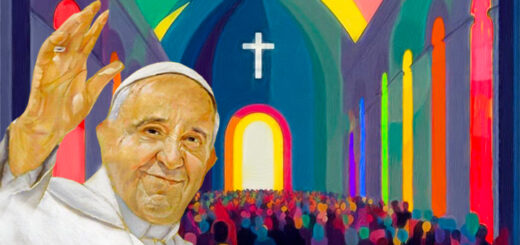Letter to parents who refuse their children because they are gay or lesbians
 Text taken from the blog The Ecrit Qui Gratte (France) of March 1, 2006, freely translated by Giacomo Tessaro
Text taken from the blog The Ecrit Qui Gratte (France) of March 1, 2006, freely translated by Giacomo Tessaro
You have just learned the homosexuality of your son, of your daughter. He/she is homosexual, he has been knowing for much more time than you. It took him, most of the time without any support, a long journey to recognize what he is, then try to accept himself as such.
He lived in the anxiety of the day when you would have been aware of it, not knowing what would have been your reaction. You have to love each other as you are, not on a lie, right?
In one way or another, and even if everything took place in an atmosphere of tension, finally it has opened up to you and it is up to you now not to break the trusted dynamics that has been established. If you find that the image you made of your child has changed, even shaken by the news, his intimate personality has not changed.
He remains exactly the same/the same that you knew, with his qualities and his defects. He has not chosen to be what he is, but he will probably remain for life likely. If you accept well, you can live as happy as anyone else.
Know well that:
1. You have no fault.
2. You have not been prepared for this, you will have to learn it.
3. In the current state of knowledge we totally ignore the origins of homosexuality. “There is nothing to understand. You have to love your child and accept him. "
4. Too often reduced to a stereotyped image, homosexuality can express itself and be lived in very different ways, both as regards the feelings and sexual behaviors or practices. The term refers to a great variety of situations.
5
6. It is better to leave time at the time. By dialogue and listening, it is possible to understand and progressively accept your child in its difference.
7. However, do not forget that it is one of the greatest causes of suicide with young people when they feel denied or even refused: a homosexual child is much better than a dead child, right?
8. But you will have to kill the son/daughter you had in the lead to accept another/another. You had set up a script for life ... so much worse, you will have to mourn you for the ideal son, for the ideal daughter.
9. The social and cultural representations of homosexuality refer you to caricatured images. In front of these clichés you parents feel deeply disoriented or even shocked.
But these representations are largely reductive and do not take anything away from the qualities of balance, generosity and listening to numerous homosexuals.
10. The meeting places appear, in the collective imagination, like true depravation symbols. In reality, for homosexuals who frequent them, these places are sometimes the only possible refuge to express their difference to the shelter from the trying looks again.
The bars and discos are, for many, essentially of the places of frank conviviality and fun. Not all homosexual people attend them that there are no more anywhere. Not even all the hetero attend discos ...
11. Society, the media, religions willingly confuse homosexuality and pedophilia. Now homosexuality presupposes an egalitarian relationship between two consenting people. This is not the case of pedophilia: the child is in a state of dependence and submission with respect to the adult, which constitutes for him a model of knowledge, law and morality. Homosexuality is a free and legal act. It could not in any case be assimilated to pedophilia, which constitutes very clearly a sexual abuse and can be of both heterosexual and homosexual nature.
12. L’associazione, spesso sistematica, di omosessualità maschile e AIDS resta assai tenace nella coscienza collettiva. Essa proviene dai discorsi dei media che parlavano di “cancro gay” all’inizio degli anni ’80. Questo timore dei genitori di fronte al rischio di vedere il loro figlio omosessuale colpito da questo virus è legittimo, ma come per ogni genitore di un figlio in età di avere una vita sessualmente attiva.
I clichés riduttivi non rendono conto della realtà. Il pericolo non viene dai “gruppi a rischio” ma piuttosto dalle “pratiche a rischio”. Questo deve invitare a tenere molto presto ai propri figli un discorso informativo di prevenzione, precisando loro, senza tabù, le modalità di trasmissione e, di fatto, i mezzi di protezione.
13. L’esclusione sociale o familiare può causare condotte suicidarie. Sentirsi rifiutato dalla società, dalle persone vicine o dall’ambiente familiare può indurre degli atteggiamenti a rischio nella logica del “non avere più niente da perdere”.
14. L’immagine sociale degli omosessuali è in costante evoluzione in Francia. Questa evoluzione della mentalità è stata accompagnata da un arretramento costante delle disposizioni legislative discriminatorie.
15 Homophobia still exists, as xenophobia exists and undoubtedly for the same irrational reasons. That's why you have to remain very vigilant, a regression is always possible.
16. Your children need you. You can, too, refuse to lie about their lives and act to make sure that it is not despised due to their sexual orientation and testify that your child has remained the same and that you have kept your trust and love for him.
Yes, you would undoubtedly prefer that your child/daughter is different but trying to "heal him" is useless, since there is nothing to heal. If you try to force your child to change, he risks refusing or making himself unhappy trying to like you. On the contrary, it is essential that you respect his way of life, that you try to understand it and that you help him to accept himself as he is, surrounding him with all your love.
This path is not easy and it takes time to travel it, but only this approach, based on listening, dialogue and absence of judgment can be constructive. What you wish you for your child is that he is happy, isn't it?
Original text: Letre ouvero aux parents d'Homos trentes par una attitude homophobe ou lesbophobe






